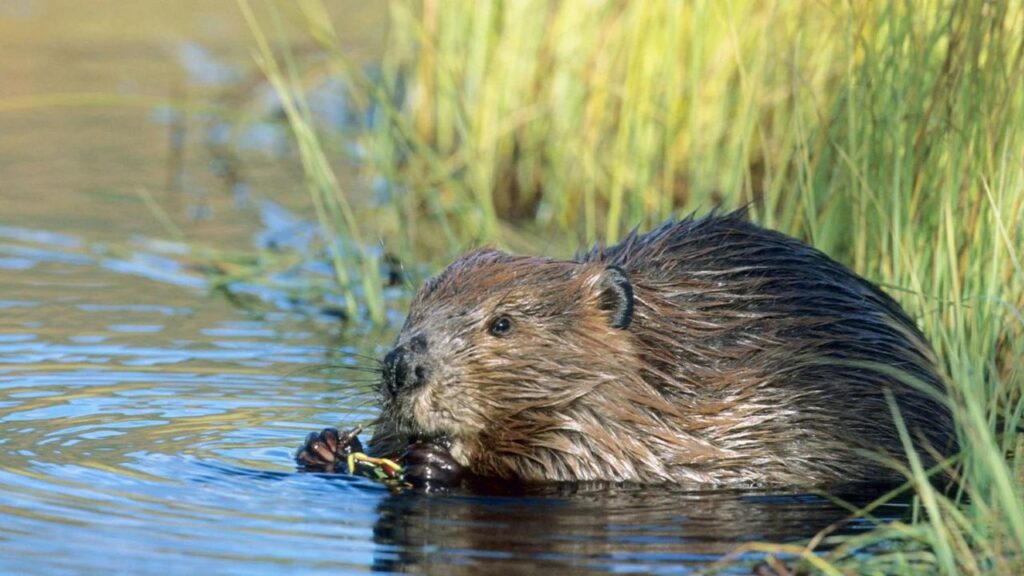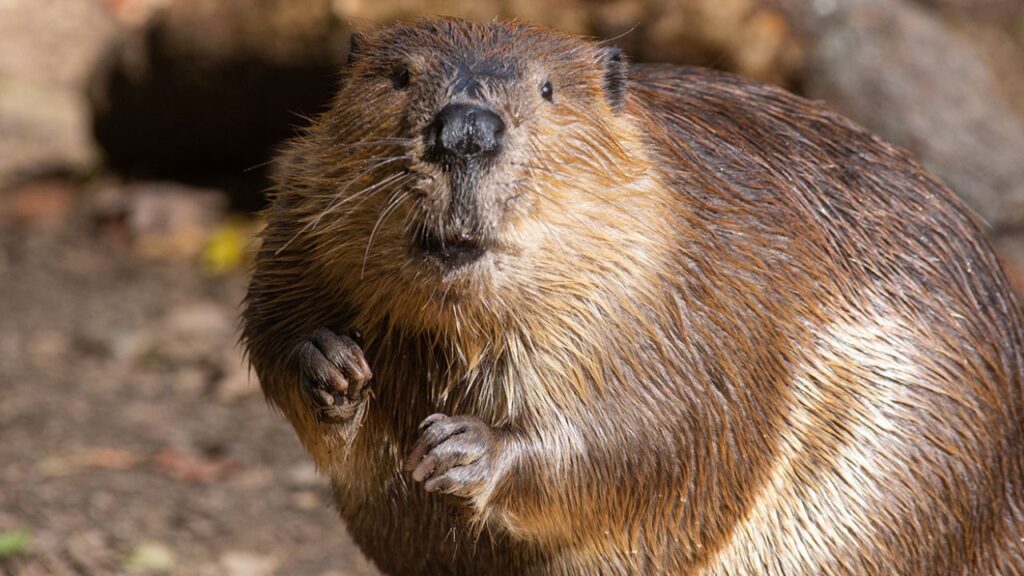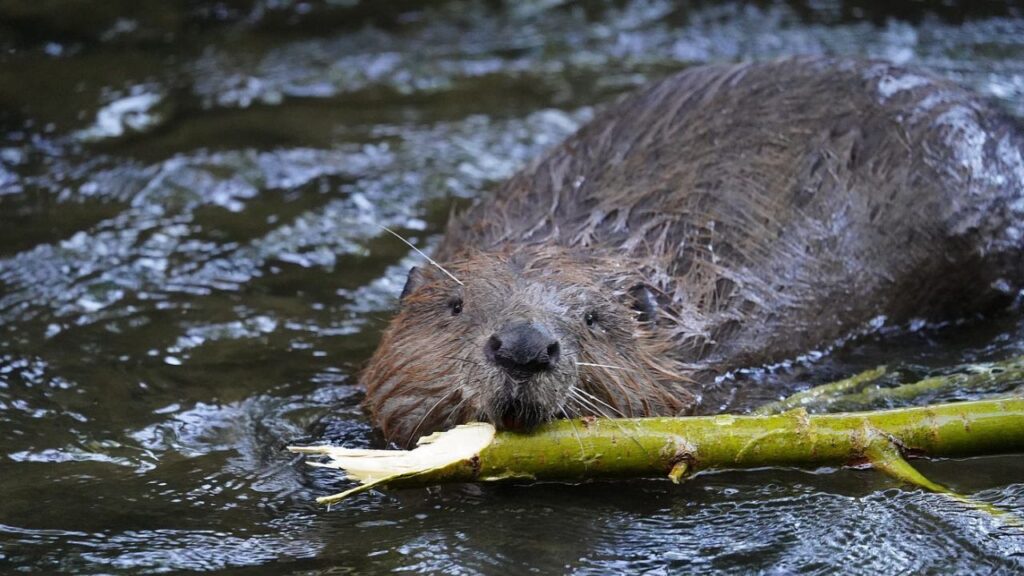Do Beavers Attack Humans? Beavers rarely attack humans, but when they do, it’s usually in self-defense, especially if they feel threatened or their territory is invaded.
Beavers are fascinating creatures known for their industrious nature, particularly their ability to construct elaborate dams and lodges.
These animals play a crucial role in their ecosystems, shaping the environment and benefiting countless other species.
However, when it comes to interactions with humans, a question that often arises is whether beavers pose any danger. Do beavers attack humans?
While the answer is not entirely straightforward, this article will delve deep into the topic, exploring the behavior of beavers, the circumstances under which they might attack, and how to safely coexist with these remarkable animals.
Contents
What Are Beavers?
Beavers are large, semi-aquatic rodents that are native to North America and Europe. There are two species of beavers: the North American beaver (Castor canadensis) and the Eurasian beaver (Castor fiber).
Both species are remarkably similar in appearance and behavior, with the primary difference being their geographical range.
Physical Characteristics
- Size and Weight: Beavers are the second-largest rodents in the world, with adults typically weighing between 35 to 70 pounds and measuring around 3 to 4 feet in length, including their distinctive, flat tails.
- Fur: Their dense, waterproof fur ranges in color from dark brown to reddish-brown, providing insulation and protection in their aquatic environments.
- Teeth: One of the most distinctive features of beavers is their large, orange-colored incisors, which grow continuously and are used for gnawing through wood and vegetation.
Habitat
Beavers are highly adaptable and can be found in a variety of freshwater environments, including rivers, streams, ponds, and lakes.
They are most famous for their dam-building behavior, which creates ponds that provide a safe haven for their lodges.
These lodges, constructed from sticks, mud, and stones, serve as their homes and offer protection from predators. [Do Beavers Attack Humans?]

Behavior
Beavers are known for their industrious nature. They are primarily nocturnal, spending most of their time at night building and maintaining their dams and lodges, foraging for food, and grooming their fur.
Beavers are herbivores, feeding primarily on the bark, leaves, and twigs of trees such as willows, poplars, and birches.
In winter, when food is scarce, they rely on food caches stored in the water near their lodges.
Beavers are social animals, typically living in family units called colonies. [Do Beavers Attack Humans?]
These colonies usually consist of a mated pair, their young kits, and occasionally older offspring from previous years.
Beavers are highly territorial and will defend their territory from intruders, both of their own species and others.
Do Beavers Attack Humans?
The question of whether beavers attack humans is not a simple yes or no answer. While beaver attacks on humans are extremely rare, they can and do happen under certain circumstances.
It is important to understand the behavior and triggers that might lead a beaver to become aggressive. [Do Beavers Attack Humans?]
Natural Behavior Towards Humans
In general, beavers are shy and reclusive animals that prefer to avoid contact with humans. They are not naturally aggressive and will usually flee when they encounter people.
Most human-beaver interactions occur when people are observing them from a distance or accidentally stumble upon their habitat while hiking or engaging in other outdoor activities.
In these cases, beavers will typically retreat into the water or their lodges, where they feel safe.
However, like many wild animals, beavers can become aggressive if they feel threatened or cornered. [Do Beavers Attack Humans?]
When provoked, a beaver may resort to defensive behaviors, including biting, which can be dangerous given their powerful jaws and sharp incisors.
Instances of Beaver Attacks
Although beaver attacks on humans are rare, there have been documented cases where such incidents have occurred.
In most cases, these attacks have been the result of the beaver feeling threatened or being provoked.
For example, people attempting to capture or handle a beaver may be bitten in self-defense. Additionally, beavers that are sick or injured may be more likely to exhibit aggressive behavior.
In some instances, beaver attacks have been linked to rabies, a viral disease that affects the central nervous system and can cause animals to become unusually aggressive.
While rabies is rare in beavers, it is a possibility that should not be overlooked, especially if the animal is acting strangely or appears disoriented.

Why Do Beavers Attack Humans?
Understanding the reasons behind beaver attacks on humans can help prevent such incidents and promote safer interactions with these animals. There are several key factors that can lead to a beaver becoming aggressive:
Self-Defense
The most common reason for a beaver to attack a human is self-defense. Beavers are naturally wary of humans and will usually try to avoid contact.
However, if a beaver feels cornered or threatened, it may attack to protect itself. This is particularly true if a human approaches a beaver too closely or tries to capture or handle it.
Territorial Instinct
Beavers are highly territorial animals, and they will defend their territory from intruders, including humans. [Do Beavers Attack Humans?]
If a person gets too close to a beaver’s dam, lodge, or food cache, the beaver may perceive this as a threat and respond aggressively.
Territorial behavior is especially pronounced during the breeding season, when beavers are more protective of their young and their habitat.
Rabies Infection
Rabies is a viral disease that can affect any mammal, including beavers. Infected animals may exhibit unusual behavior, including aggression, disorientation, and a lack of fear of humans.
While rabies is relatively rare in beavers, it is a serious concern because it can be transmitted to humans through bites or scratches.
If a beaver appears to be acting erratically or aggressively without provocation, rabies should be considered a possible cause.
Injured or Sick Beavers
Beavers that are injured or sick may also be more prone to aggression. Injured animals are often in pain and may lash out if they feel threatened.
Similarly, beavers that are sick with conditions other than rabies may become more defensive and less likely to flee from humans.

Are Beaver Attacks Dangerous?
While beaver attacks on humans are rare, they can be dangerous when they do occur. Beavers have powerful jaws and large, sharp incisors that are capable of inflicting serious injuries.
A beaver bite can result in deep puncture wounds, lacerations, and even broken bones in some cases.
Potential Dangers of a Beaver Attack
- Serious Bites: Beaver bites can cause significant damage due to the animal’s strong jaws and sharp teeth. These bites can lead to deep wounds that may require stitches or surgery to repair.
- Risk of Infection: Like any animal bite, beaver bites carry a risk of infection. The bacteria present in the beaver’s mouth can cause infections if the wound is not properly cleaned and treated. In rare cases, these infections can lead to more serious complications.
- Rabies Transmission: If the beaver is rabid, there is a risk of rabies transmission through the bite. Rabies is a life-threatening disease that requires immediate medical attention. Symptoms of rabies in humans can take weeks to appear, but once they do, the disease is almost always fatal if not treated promptly.
Real-Life Examples
There have been a few documented cases of beaver attacks on humans that illustrate the potential dangers.
For example, in 2013, a fisherman in Belarus was killed after being bitten by a beaver while trying to take a photo of it.
The bite severed a major artery in the man’s leg, leading to fatal blood loss. This tragic incident highlights the importance of exercising caution around wild animals, even those that are not typically aggressive.
How to Avoid Beaver Attacks?
Given the potential dangers associated with beaver attacks, it is important to take steps to avoid provoking these animals and to minimize the risk of an encounter turning dangerous. Here are some tips on how to safely coexist with beavers:
Keep a Safe Distance
The most effective way to avoid a beaver attack is to keep a safe distance from the animal. [Do Beavers Attack Humans?]
If you encounter a beaver in the wild, observe it from afar and do not attempt to approach or interact with it.
Beavers are naturally shy and will usually retreat if they feel they are being watched.
Avoid Provoking Them
Never attempt to capture or handle a beaver, even if it appears to be injured or in distress. Beavers are wild animals and will defend themselves if they feel threatened.
If you come across a beaver that is behaving strangely or appears to be injured, it is best to contact a wildlife professional for assistance.
Stay Away from Beaver Dams and Lodges
Beavers are highly territorial and will defend their dams and lodges from intruders. If you are hiking or exploring near a beaver habitat, avoid getting too close to their structures.
Disturbing a beaver’s dam or lodge can provoke an aggressive response, especially during the breeding season when beavers are more protective of their young.
What to Do if Attacked
If you are attacked by a beaver, try to remain calm and avoid further provoking the animal. Use any available object to create a barrier between yourself and the beaver, and slowly back away from the area.
Once you are at a safe distance, seek medical attention for any injuries, as even minor bites can lead to infection.
If there is any suspicion that the beaver may be rabid, it is important to seek medical care immediately, as rabies is a serious and potentially fatal disease.
Final Verdict
In summary, while beaver attacks on humans are exceedingly rare, they can occur under certain circumstances, particularly when the animal feels threatened or if it is rabid.
Beavers are generally shy and prefer to avoid human contact, but they will defend themselves and their territory if necessary. [Do Beavers Attack Humans?]
Understanding beaver behavior and taking precautions to avoid provoking these animals can help prevent dangerous encounters and promote peaceful coexistence.
See Also: Do Jaguars Attack Humans? The Terrifying Truth!
FAQs
Are beavers naturally aggressive?
No, beavers are not naturally aggressive and generally prefer to avoid human contact. However, they may become aggressive if they feel threatened or if their territory is invaded.
What should I do if I encounter a beaver in the wild?
If you encounter a beaver in the wild, keep a safe distance and avoid approaching or interacting with the animal. Beavers will usually retreat if they feel they are being observed.
Can beaver bites transmit diseases?
Yes, beaver bites can transmit bacteria that may cause infections. In rare cases, beavers can also transmit rabies through bites, so it is important to seek medical attention if bitten.
How can I tell if a beaver is rabid?
Rabid beavers may exhibit unusual behavior, such as aggression, disorientation, or a lack of fear of humans. If you encounter a beaver displaying these signs, avoid contact and seek help from wildlife authorities.
What is the safest way to observe beavers in their natural habitat?
The safest way to observe beavers is from a distance, using binoculars or a camera with a zoom lens. Avoid getting too close to their dams or lodges, and never attempt to interact with the animals.
Conclusion: Do Beavers Attack Humans?
Beavers are remarkable creatures that play a vital role in their ecosystems. While they are not typically aggressive, it is important to respect their space and avoid actions that might provoke them.
By understanding their behavior and taking simple precautions, we can safely enjoy observing these industrious animals in the wild without putting ourselves or the beavers at risk.

Hello, I am Rosa Ellis, a mother of two and a wildlife blogger. I grew up in New York City, but I love exploring forests. I’ve traveled to places like Yellowstone National Park and the Amazon Rainforest to see animals up close. I know a lot about animal behavior and which animals can be dangerous to humans. Thanks for visiting my blog!

